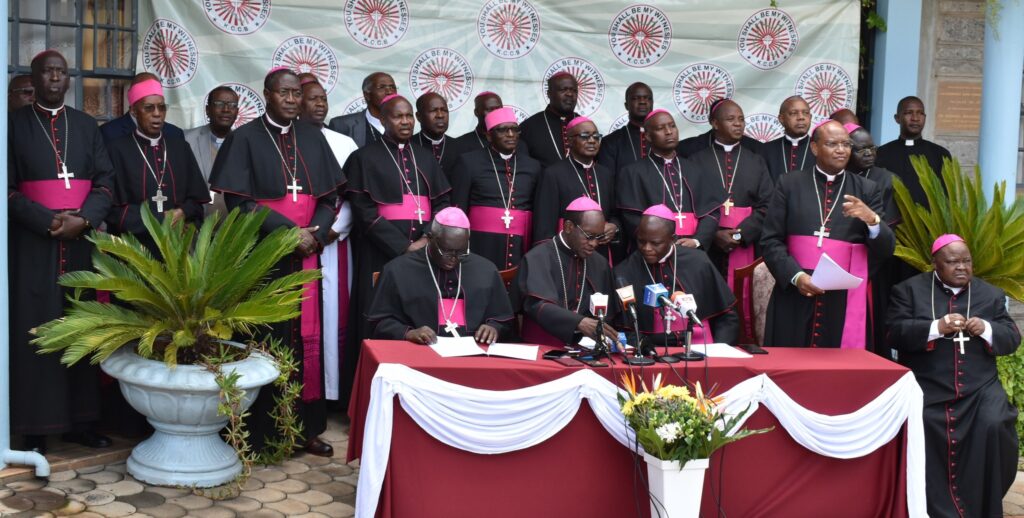KENYA: Church-State Relation in Tension as Catholic Bishops Fault Kenyan Government Over Systematic Scheme to Subvert the Church

Catholic Bishops Issue a Presser at Donum Dei Roussel House in Karen, Nairobi
Elizabeth Asasha
The Kenya Conference of Catholic Bishops (KCCB) has placed the Kenyan government on the spot over a perceived systematic scheme to subvert the role of the Church as a key stakeholder in various sectors of the economy.
Addressing the media at a presser convened Thursday, April 11, the Catholic prelates expressed grave concerns over what they perceive as a deliberate gradual intent by the government to undermine the role of the Catholic Church in the Education and Health sectors.
The Catholic bishops spoke shortly after the bishops’ plenary at the Donum Dei Roussel House in the Karen, Nairobi, noting the changing dynamics in Church-State relations in two key sectors and the “gradual attempt to wrestle the management and role of churches in the schools” which, they observed has been happening since independence.
“We are concerned about the deliberate intent to reduce and undermine the role of the Catholic Church, and indeed all faiths as safeguards of morality in society, and especially decry this subversion in the fields of Education and Health,” stated Most. Rev. Maurice Muhatia Makumba of Kisumu Archdiocese who has succeeded Archbishop Martin Kivuva as chairman of the Kenya Conference of Catholic Bishops (KCCB) in the triennial elections conducted during the plenary this week.
The prelates spotlighted the threat posed by recent government policies, which they argue undermine the autonomy of Church-founded educational institutions by seeking to ‘dilute the role of the Church in school management,’ a move strongly opposed by the bishops, who also highlighted the significant historical contribution of the Catholic Church in providing holistic education and quality healthcare services to all Kenyans, irrespective of their social status or tribe.”
“The proposed legislation undermines the foundational arrangement between the Church and the State regarding the management of Church-founded educational institutions,” remarked Rt. Rev. Muhatia on Catholic education which is rooted in holistic formation, “It not only jeopardizes academic education but also compromises the moral formation integral to our schools.”
The bishops vehemently voiced their disapproval of the propounded Basic Education Bill 2024 and Universities Bill (amendment) 2024, in what they term as the Dilution of the “Sponsors” Role in Education, deemed as part of the subterfuge to sideline the church from the key role it has played in schools and other educational institutions for more than a century.
“We, therefore, decry and reject the systematic scheme to undermine and weaken our management role as the founders of the Catholic Sponsored schools.” Asserted KCCB.
“As a major stakeholder in the provision of education, we as a Church have a right to actively engage in the overall management and supervision of all our private and Catholic-sponsored schools. Most of these were born out of the initiative of the Catholic Church.” Read part of the statement issued Thursday morning in Kenya’s capital, Nairobi.
KCCB further voiced qualms over the government’s interference in faith-based universities through the proposed Universities Bill (amendment) 2024, criticizing the granting of unilateral power to dissolve or merge private universities without consulting owners and relevant stakeholders, terming this as an infringement on institutional autonomy.
In a supplemental exposé of the government’s ruse to arm-twist the church, KCCB drew attention to and condemned the recent outrageous hike in work permit fees for missionaries, which rose from Kshs 15,000 to Kshs 150,000 approximately from 100 to 1,500 US Dollars), labeling it as unethical and lacking in gratitude for the immense and selfless contributions of religious men and women to Kenyan society.
“This is unethical and shows a lack of gratitude to people dedicating their lives to the good of society.” read the current deputy chairman of the KCCB, Archbishop Anthony Muheria of the Nyeri Metropolitan See.
“We as a country should be showing gratitude and appreciation through giving waivers to priests, religious men and women, and other social missionary volunteers who come to complement our social engagement.” lamented the bishops urging the government to reconsider the decision and revoke the levy.
In the healthcare domain, the bishops decried the huge outstanding debts owed to faith-based hospitals by the National Hospital Insurance Fund (NHIF), amounting to over Kshs. 2 billion. They urged the government to honor its obligations and promptly clear the debts to avert further severe implications that could further impair the already debilitated operations in hundreds of church-owned healthcare facilities across the nation.
They said, “The effect is that most of our Hospitals are crippled and not able to operate optimally, to offer services to the needy many are now unable to procure medicines and pay salaries.”
KCCB cautioned against using ailing Kenyans as bargaining chips, entreating both the government and medical practitioners to prioritize the well-being of patients and seek a swift and lasting resolution to the ongoing impasse which has left the healthcare system dangling in limbo for close to one month.
“We urge the government on one hand, and the doctors on the other hand to seek a working arrangement that does not put the lives of patients at risk so that lives are not lost,” Urged KCCB.
Faith-based organizations play a pivotal role in healthcare provision across Kenya.
The Kenya Conference of Catholic Bishops (KCCB) and the Christian Health Association of Kenya (CHAK) collectively oversee a network of over 800 affiliated facilities, accounting for an estimated 30% of healthcare services nationwide.
Recent data reveals the expansive healthcare footprint of the Catholic Church, encompassing a network of 451 centers, over 70 mission hospitals, 117 health centers, 14 medical training colleges, and 251 dispensaries.


